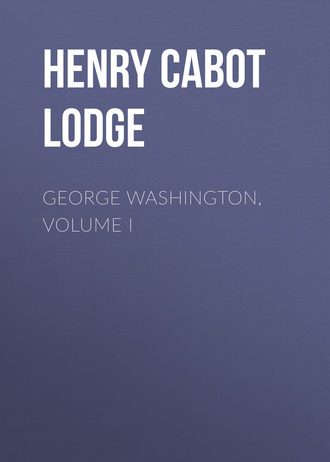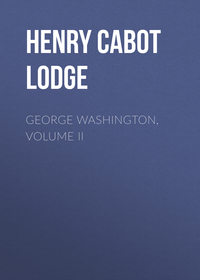 полная версия
полная версияGeorge Washington, Volume I
In Virginia, meanwhile, during these long midsummer days, while Washington was waiting and planning, Cornwallis had been going up and down, harrying, burning, and plundering. His cavalry had scattered the legislature, and driven Governor Jefferson in headlong flight over the hills, while property to the value of more than three millions had been destroyed. Lafayette, sent by Washington to maintain the American cause, had been too weak to act decisively, but he had been true to his general's teaching, and, refusing battle, had hung upon the flanks of the British and harassed and checked them. Joined by Wayne, he had fought an unsuccessful engagement at Green Springs, but brought off his army, and with steady pertinacity followed the enemy to the coast, gathering strength as he moved. Now, when all was at last ready, Washington began to draw his net about Cornwallis, whom he had been keenly watching during the victorious marauding of the summer. On the news of the coming of the French fleet, he wrote to Lafayette to be prepared to join him when he reached Virginia, to retain Wayne, who intended to join Greene, and to stop Cornwallis at all hazards, if he attempted to go southward.
Cornwallis, however, had no intention of moving. He had seen the peril of his position, and had wished to withdraw to Charleston; but the ministry, highly pleased with his performances, wished him to remain on the Chesapeake, and decisive orders came to him to take a permanent post in that region. Clinton, moreover, was jealous of Cornwallis, and, impressed and deceived by Washington's movements, he not only sent no reinforcements, but detained three thousand Hessians, who had lately arrived. Cornwallis, therefore, had no choice, and with much writing for aid, and some protesting, he obeyed his orders, planted himself at Yorktown and Gloucester, and proceeded to fortify, while Lafayette kept close watch upon him. Cornwallis was a good soldier and a clever man, suffering, as Burgoyne did, from a stupid ministry and a dull and jealous commander-in-chief. Thus hampered and burdened, he was ready to fall a victim to the operations of a really great general, whom his official superiors in England undervalued and despised.
August 17, as soon as he had set his own machinery in motion, Washington wrote to De Grasse to meet him in the Chesapeake. He was working now more anxiously and earnestly than at any time in the Revolution, not merely because he felt that success depended on the blow, but because he descried a new and alarming danger. He had perceived it in June, and the idea pursued him until all was over, and kept recurring in his letters during this strained and eager summer. To Washington's eyes, watching campaigns and government at home and the politics of Europe abroad, the signs of exhaustion, of mediation, and of coming peace across the Atlantic were plainly visible. If peace should come as things then were, America would get independence, and be shorn of many of her most valuable possessions. The sprawling British campaign of maraud and plunder, so bad in a military point of view, and about to prove fatal to Cornwallis, would, in case of sudden cessation of hostilities, be capable of the worst construction. Time, therefore, had become of the last importance. The decisive blow must be given at once, and before the slow political movements could come to a head. On July 14, Washington had his plan mapped out. He wrote in his diary:—
"Matters having now come to a crisis, and a decided plan to be determined on, I was obliged—from the shortness of Count De Grasse's promised stay on this coast, the apparent disinclination of their naval officers to force the harbor of New York, and the feeble compliance of the States with my requisitions for men hitherto, and the little prospect of greater exertions in future—to give up all ideas of attacking New York, and instead thereof to remove the French troops and a detachment from the American army to the Head of Elk, to be transported to Virginia for the purpose of coöperating with the force from the West Indies against the troops in that State."
Like most of Washington's plans, this one was clear-cut and direct, and looks now simple enough, but at the moment it was hedged with almost inconceivable difficulties at every step. The ever-present and ever-growing obstacles at home were there as usual. Appeals to Morris for money were met by the most discouraging responses, and the States seemed more lethargic than ever. Neither men nor supplies could be obtained; neither transportation nor provision for the march could be promised. Then, too, in addition to all this, came a wholly new set of stumbling-blocks arising among the allies. Everything hinged on the naval force. Washington needed it for a short time only; but for that crucial moment he must have not only superiority but supremacy at sea. Every French ship that could be reached must be in the Chesapeake, and Washington had had too many French fleets slip away from him at the last moment and bring everything to naught to take any chances in this direction. To bring about his naval supremacy required the utmost tact and good management, and that he succeeded is one of the chief triumphs of the campaign. In fact, at the very outset he was threatened in this quarter with a serious defection. De Barras, with the squadron of the American station, was at Boston, and it was essential that he should be united with De Grasse at Yorktown. But De Barras was nettled by the favoritism which had made De Grasse, his junior in service, his superior in command. He determined therefore to take advantage of his orders and sail away to the north to Nova Scotia and Newfoundland, and leave De Grasse to fight it out alone. It is a hard thing to beat an opposing army, but it is equally hard to bring human jealousies and ambitions into the narrow path of self-sacrifice and subordination. Alarmed beyond measure at the suggested departure of the Boston squadron, Washington wrote a letter, which De Rochambeau signed with him, urging De Barras to turn his fleet toward the Chesapeake. It was a skillfully drawn missive, an adroit mingling of appeals to honor and sympathy and of vigorous demands to perform an obvious duty. The letter did its work, the diplomacy of Washington was successful, and De Barras suppressed his feelings of disappointment, and agreed to go to the Chesapeake and serve under De Grasse.
This point made, Washington pushed on his preparations, or rather pushed on despite his lack of preparations, and on August 17, as has been said, wrote to De Grasse to meet him in the Chesapeake. He left the larger part of his own troops with Heath, to whom in carefully drawn instructions he intrusted the grave duty of guarding the Hudson and watching the British in New York. This done, he gathered his forces together, and on August 21 the army started on its march to the south. On the 23d and 24th it crossed the Hudson, without annoyance from the British of any kind. Washington had threatened New York so effectively, and manoeuvred so successfully, that Clinton could not be shaken in his belief that the real object of the Americans was his own army; and it was not until September 6 that he fully realized that his enemy was going to the south, and that Cornwallis was in danger. He even then hesitated and delayed, but finally dispatched Admiral Graves with the fleet to the Chesapeake. The Admiral came upon the French early on September 5, the very day that Washington was rejoicing in the news that De Grasse had arrived in the Chesapeake and had landed St. Simon and three thousand men to support Lafayette. As soon as the English fleet appeared, the French, although many of their men were on shore, sailed out and gave battle. An indecisive action ensued, in which the British suffered so much that five days later they burned one of their frigates and withdrew to New York. De Grasse returned to his anchorage, to find that De Barras had come in from Newport with eight ships and ten transports carrying ordnance.
While everything was thus moving well toward the consummation of the campaign, Washington, in the midst of his delicate and important work of breaking camp and beginning his rapid march to the south, was harassed by the ever-recurring difficulties of the feeble and bankrupt government of the confederation. He wrote again and again to Morris for money, and finally got some. His demands for men and supplies remained almost unheeded, but somehow he got provisions enough to start. He foresaw the most pressing need, and sent messages in all directions for shipping to transport his army down the Chesapeake. No one responded, but still he gathered the transports; at first a few, then more, and finally, after many delays, enough to move his army to Yorktown. The spectacle of such a struggle, so heroically made, one would think, might have inspired every soul on the continent with enthusiasm; but at this very moment, while Washington was breaking camp and marching southward, Congress was considering the reduction of the army!—which was as appropriate as it would have been for the English Parliament to have reduced the navy on the eve of Trafalgar, or for Lincoln to have advised the restoration of the army to a peace footing while Grant was fighting in the Wilderness. The fact was that the Continental Congress was weakened in ability and very tired in point of nerve and will-power. They saw that peace was coming, and naturally thought that the sooner they could get it the better. They entirely failed to see, as Washington saw, that in a too sudden peace lurked the danger of the uti possidetis, and that the mere fact of peace by no means implied necessarily complete success. They did not, of course, effect their reductions, but they remained inert, and so for the most part did the state governments, becoming drags upon the wheels of war instead of helpers to the man who was driving the Revolution forward to its goal. Both state and confederate governments still meant well, but they were worn out and relaxed. Yet over and through all these heavy masses of misapprehension and feebleness, Washington made his way. Here again all that can be said is that somehow or other the thing was done. We can take account of the resisting forces, but we cannot tell just how they were dealt with. We only know that one strong man trampled them down and got what he wanted done.
Pushing on after the joyful news of the arrival of De Grasse had been received, Washington left the army to go by water from the Head of Elk, and hurried to Mount Vernon, accompanied by De Rochambeau. It was six years since he had seen his home. He had left it a Virginian colonel, full of forebodings for his country, with a vast and unknown problem awaiting solution at his hands. He returned to it the first soldier of his day, after six years of battle and trial, of victory and defeat, on the eve of the last and crowning triumph. As he paused on the well-beloved spot, and gazed across the broad and beautiful river at his feet, thoughts and remembrances must have come thronging to his mind which it is given to few men to know. He lingered there two days, and then pressing on again, was in Williamsburg on the 14th, and on the 17th went on board the Ville de Paris to congratulate De Grasse on his victory, and to concert measures for the siege.
The meeting was most agreeable. All had gone well, all promised well, and everything was smiling and harmonious. Yet they were on the eve of the greatest peril which occurred in the campaign. Washington had managed to scrape together enough transports; but his almost unassisted labors had taken time, and delay had followed. Then the transports were slow, and winds and tides were uncertain, and there was further delay. The interval permitted De Grasse to hear that the British fleet had received reinforcements, and to become nervous in consequence. He wanted to get out to sea; the season was advancing, and he was anxious to return to the West Indies; and above all he did not wish to fight in the bay. He therefore proposed firmly and vigorously to leave two ships in the river, and stand out to sea with his fleet. The Yorktown campaign began to look as if it had reached its conclusion. Once again Washington wrote one of his masterly letters of expostulation and remonstrance, and once more he prevailed, aided by the reasoning and appeals of Lafayette, who carried the message. De Grasse consented to stay, and Washington, grateful beyond measure, wrote him that "a great mind knows how to make personal sacrifice to secure an important general good." Under the circumstances, and in view of the general truth of this complimentary sentiment, one cannot help rejoicing that De Grasse had "a great mind."
At all events he stayed, and thereafter everything went well. The northern army landed at Williamsburg and marched for Yorktown on the 28th. They reconnoitred the outlying works the next day, and prepared for an immediate assault; but in the night Cornwallis abandoned all his outside works and withdrew into the town. Washington thereupon advanced at once, and prepared for the siege. On the night of the 5th, the trenches were opened only six hundred yards from the enemy's line, and in three days the first parallel was completed. On the 11th the second parallel was begun, and on the 14th the American batteries played on the two advanced redoubts with such effect that the breaches were pronounced practicable. Washington at once ordered an assault. The smaller redoubt was stormed by the Americans under Hamilton and taken in ten minutes. The other, larger and more strongly garrisoned, was carried by the French with equal gallantry, after half an hour's fighting. During the assault Washington stood in an embrasure of the grand battery watching the advance of the men. He was always given to exposing himself recklessly when there was fighting to be done, but not when he was only an observer. This night, however, he was much exposed to the enemy's fire. One of his aides, anxious and disturbed for his safety, told him that the place was perilous. "If you think so," was the quiet answer, "you are at liberty to step back." The moment was too exciting, too fraught with meaning, to think of peril. The old fighting spirit of Braddock's field was unchained for the last time. He would have liked to head the American assault, sword in hand, and as he could not do that he stood as near his troops as he could, utterly regardless of the bullets whistling in the air about him. Who can wonder at his intense excitement at that moment? Others saw a brilliant storming of two outworks, but to Washington the whole Revolution, and all the labor and thought and conflict of six years were culminating in the smoke and din on those redoubts, while out of the dust and heat of the sharp quick fight success was coming. He had waited long, and worked hard, and his whole soul went out as he watched the troops cross the abattis and scale the works. He could have no thought of danger then, and when all was over he turned to Knox and said, "The work is done, and well done. Bring me my horse."
Washington was not mistaken. The work was indeed done. Tarleton early in the siege had dashed out against Lauzun on the other side of the river and been repulsed. Cornwallis had been forced back steadily into the town, and his redoubts, as soon as taken, were included in the second parallel. A sortie to retake the redoubts failed, and a wild attempt to transport the army across the river was stopped by a gale of wind. On the 17th Cornwallis was compelled to face much bloody and useless slaughter, or to surrender. He chose the latter course, and after opening negotiations and trying in vain to obtain delay, finally signed the capitulation and gave up the town. The next day the troops marched out and laid down their arms. Over 7000 British and Hessian troops surrendered. It was a crushing defeat. The victorious army consisted in round numbers of 5500 continentals, 3500 militia, and 7000 French, and they were backed by the French fleet with entire control of the sea.
When Washington had once reached Yorktown with his fleet and army, the campaign was really at an end, for he held Cornwallis in an iron grip from which there was no escape. The masterly part of the Yorktown campaign lay in the manner in which it was brought about, in the management of so many elements, and in the rapidity of movement which carried an army without any proper supplies or means of transportation from New York to the mouth of Chesapeake Bay. The control of the sea had been the great advantage of the British from the beginning, and had enabled them to achieve all that they ever gained. With these odds against him, with no possibility of obtaining a fleet of his own, Washington saw that his only chance of bringing the war to a quick and successful issue was by means of the French. It is difficult to manage allied troops. It is still more difficult to manage allied troops and an allied fleet. Washington did both with infinite address, and won. The chief factor of his success in this direction lay in his profound personal influence on all men with whom he came in contact. His courtesy and tact were perfect, but he made no concessions, and never stooped. The proudest French noble who came here shrank from disagreement with the American general, and yet not one of them had anything but admiration and respect to express when they wrote of Washington in their memoirs, diaries, and letters. He impressed them one and all with a sense of power and greatness which could not be disregarded. Many times he failed to get the French fleet in coöperation, but finally it came. Then he put forth all his influence and all his address, and thus he got De Barras to the Chesapeake, and kept De Grasse at Yorktown.
This was one side of the problem, the most essential because everything hinged on the fleet, but by no means the most harassing. The doubt about the control of the sea made it impossible to work steadily for a sufficient time toward any one end. It was necessary to have a plan for every contingency, and be ready to adopt any one of several plans at short notice. With a foresight and judgment that never failed, Washington planned an attack on New York, another on Yorktown, and a third on Charleston. The division of the British forces gave him his opportunity of striking at one point with an overwhelming force, but there was always the possibility of their suddenly reuniting. In the extreme south he felt reasonably sure that Greene would hold Rawdon, but he was obliged to deceive and amuse Clinton, and at the same time, with a ridiculously inferior force, to keep Cornwallis from marching to South Carolina. Partly by good fortune, partly by skill, Cornwallis was kept in Virginia, while by admirably managed feints and threats Clinton was held in New York in inactivity. When the decisive moment came, and it was evident that the control of the sea was to be determined in the Chesapeake, Washington, overriding all sorts of obstacles, moved forward, despite a bankrupt and inert government, with a rapidity and daring which have been rarely equaled. It was a bold stroke to leave Clinton behind at the mouth of the Hudson, and only the quickness with which it was done, and the careful deception which had been practiced, made it possible. Once at Yorktown, there was little more to do. The combination was so perfect, and the judgment had been so sure, that Cornwallis was crushed as helplessly as if he had been thrown before the car of Juggernaut. There was really but little fighting, for there was no opportunity to fight. Washington held the British in a vice, and the utter helplessness of Cornwallis, the entire inability of such a good and gallant soldier even to struggle, are the most convincing proofs of the military genius of his antagonist.
CHAPTER XI
PEACE
Fortitude in misfortune is more common than composure in the hour of victory. The bitter medicine of defeat, however unpalatable, is usually extremely sobering, but the strong new wine of success generally sets the heads of poor humanity spinning, and leads often to worse results than folly. The capture of Cornwallis was enough to have turned the strongest head, for the moment at least, but it had no apparent effect upon the man who had brought it to pass, and who, more than any one else, knew what it meant. Unshaken and undismayed in the New Jersey winter, and among the complicated miseries of Valley Forge, Washington turned from the spectacle of a powerful British army laying down their arms as coolly as if he had merely fought a successful skirmish, or repelled a dangerous raid. He had that rare gift, the attribute of the strongest minds, of leaving the past to take care of itself. He never fretted over what could not be undone, nor dallied among pleasant memories while aught still remained to do. He wrote to Congress in words of quiet congratulation, through which pierced the devout and solemn sense of the great deed accomplished, and then, while the salvos of artillery were still booming in his ears, and the shouts of victory were still rising about him, he set himself, after his fashion, to care for the future and provide for the immediate completion of his work.
He wrote to De Grasse, urging him to join in an immediate movement against Charleston, such as he had already suggested, and he presented in the strongest terms the opportunities now offered for the sudden and complete ending of the struggle. But the French admiral was by no means imbued with the tireless and determined spirit of Washington. He had had his fill even of victory, and was so eager to get back to the West Indies, where he was to fall a victim to Rodney, that he would not even transport troops to Wilmington. Thus deprived of the force which alone made comprehensive and extended movements possible, Washington returned, as he had done so often before, to making the best of cramped circumstances and straitened means. He sent all the troops he could spare to Greene, to help him in wresting the southern States from the enemy, the work to which he had in vain summoned De Grasse. This done, he prepared to go north. On his way he was stopped at Eltham by the illness and death of his wife's son, John Custis, a blow which he felt severely, and which saddened the great victory he had just achieved. Still the business of the State could not wait on private grief. He left the house of mourning, and, pausing for an instant only at Mount Vernon, hastened on to Philadelphia. At the very moment of victory, and while honorable members were shaking each other's hands and congratulating each other that the war was now really over, the commander-in-chief had fallen again to writing them letters in the old strain, and was once more urging them to keep up the army, while he himself gave his personal attention to securing a naval force for the ensuing year, through the medium of Lafayette. Nothing was ever finished with Washington until it was really complete throughout, and he had as little time for rejoicing as he had for despondency or despair, while a British force still remained in the country. He probably felt that this was as untoward a time as he had ever met in a pretty large experience of unsuitable occasions, for offering sound advice, but he was not deterred thereby from doing it. This time, however, he was destined to an agreeable disappointment, for on his arrival at Philadelphia he found an excellent spirit prevailing in Congress. That body was acting cheerfully on his advice, it had filled the departments of the government, and set on foot such measures as it could to keep up the army. So Washington remained for some time at Philadelphia, helping and counseling Congress in its work, and writing to the States vigorous letters, demanding pay and clothing for the soldiers, ever uppermost in his thoughts.
But although Congress was compliant, Washington could not convince the country of the justice of his views, and of the continued need of energetic exertion. The steady relaxation of tone, which the strain of a long and trying war had produced, was accelerated by the brilliant victory of Yorktown. Washington for his own part had but little trust in the sense or the knowledge of his enemy. He felt that Yorktown was decisive, but he also thought that Great Britain would still struggle on, and that her talk of peace was very probably a mere blind, to enable her to gain time, and, by taking advantage of our relaxed and feeble condition, to strike again in hope of winning back all that had been lost. He therefore continued his appeals in behalf of the army, and reiterated everywhere the necessity for fresh and ample preparations.





